การเรียนรู้ภาษาอังกฤษในช่วงเลือกตั้ง
During an election period, individuals may feel motivated to enhance their English language skills for various reasons. Whether it is for personal growth, career advancement, or simply to better understand the political discourse, learning English can open up new opportunities and perspectives. With the increasing importance of English as a global language, investing time and effort in learning the language can provide numerous benefits.
One way to learn English during an election period is to enroll in language courses or programs. Many educational institutions offer English language classes tailored to different proficiency levels. These courses typically cover grammar, vocabulary, reading, writing, speaking, and listening skills. By attending classes regularly, students can improve their English proficiency and gain confidence in using the language.
Another popular option for learning English is to hire a private tutor. Tutors can provide personalized instruction and feedback, addressing individual learning needs and goals. This one-on-one approach can be particularly beneficial for those who prefer a more focused and intensive learning experience.
For those who prefer self-study, there are numerous online resources available to improve English language skills. Websites, apps, and online courses offer a wide range of materials, including interactive exercises, videos, articles, and audio recordings. By incorporating these resources into their daily routine, learners can practice English anytime and anywhere at their own pace.
วิธีเลือกที่เหมาะสมในการศึกษาภาษาอังกฤษ
When choosing a study method for learning English, it is essential to consider individual learning preferences, goals, and available resources. Some people may prefer traditional classroom-based instruction, while others may opt for self-study or online learning. The key is to find a method that fits one’s learning style and schedule.
One effective way to study English is through immersion. Immersive language programs offer opportunities to learn English in a real-life context, such as through cultural exchanges, language trips, or living in an English-speaking country. Immersion can accelerate language learning by providing constant exposure to the language and opportunities to practice speaking and listening skills.
Another popular method for studying English is through language exchange programs. These programs pair language learners with native speakers of the target language for mutual learning and practice. By engaging in conversations with native speakers, learners can improve their language skills while also helping others learn their native language.
For those with limited time or resources, online learning platforms can be a convenient and flexible option. Websites like Duolingo, Babbel, and Rosetta Stone offer interactive lessons, quizzes, and games to help learners improve their English proficiency. These platforms allow users to track their progress, set goals, and practice different language skills at their own pace.
ความสำคัญของการมีความสามารถในการสื่อสารภาษาอังกฤษ
Having the ability to communicate effectively in English is crucial in today’s globalized society. English is widely used in various fields, including business, education, science, technology, and diplomacy. Proficiency in English can open up new job opportunities, enable international collaborations, and facilitate cross-cultural communication.
In the political context, English proficiency is particularly important for understanding and participating in the global political discourse. With English being the lingua franca of international relations, individuals with strong English language skills can engage with a broader audience, access a wealth of information, and contribute to meaningful discussions on political issues.
Furthermore, English proficiency is essential for engaging with international media, academic publications, and online resources. By being able to read, listen, and understand English content, individuals can stay informed about current events, trends, and debates happening around the world. This knowledge can lead to a deeper understanding of global politics and help individuals make informed decisions during elections.
การเลือกตั้งเรียนภาษาอังกฤษในสถาบันการศึกษา
When considering where to study English during an election period, individuals have several options to choose from. Educational institutions, such as language schools, colleges, and universities, offer a wide range of English language programs tailored to different proficiency levels and learning objectives. These programs can provide structured curriculum, qualified instructors, and opportunities for social interaction with peers.
Language schools are another popular choice for learning English. These institutions specialize in language education and typically offer intensive courses, exam preparation, and language immersion programs. Language schools often have small class sizes, interactive teaching methods, and cultural activities to enhance the learning experience.
For those seeking a more academic approach to learning English, colleges and universities offer undergraduate and postgraduate programs in English language and literature. These programs cover a wide range of topics, including linguistics, literature, writing, and communication skills. Students can deepen their knowledge of the English language while also exploring its cultural and historical significance.
In addition to formal education, individuals can also consider attending English language workshops, conferences, and seminars during an election period. These events provide opportunities to learn from experts in the field, network with other language learners, and stay updated on the latest trends and developments in English language education.
การใช้เทคโนโลยีในการฝึกฝนทักษะการพูดและฟังภาษาอังกฤษ
Technology has revolutionized the way we learn and practice languages, including English. There are numerous tools and resources available that can help individuals improve their speaking and listening skills in English. From language learning apps to online tutoring platforms, technology offers a wide range of options for language practice.
One of the most popular ways to practice speaking and listening in English is through language exchange apps. Apps like Tandem, HelloTalk, and Speaky connect language learners with native speakers for virtual conversations. These apps provide a platform for users to practice speaking, receive feedback, and learn about different cultures in a fun and interactive way.
Another effective technology tool for language practice is language learning apps. Apps like FluentU, BBC Learning English, and Lingodeer offer interactive lessons, videos, podcasts, and quizzes to help users improve their English skills. By incorporating these apps into their daily routine, learners can practice listening comprehension, vocabulary, and pronunciation in a engaging and personalized manner.
For those seeking more structured language practice, online tutoring platforms like Italki, Verbling, and Preply offer one-on-one lessons with qualified language instructors. These platforms allow users to schedule lessons at their convenience, receive personalized feedback, and track their progress over time. Online tutoring can be a valuable tool for improving speaking and listening skills in English.
วิธีเลือกจุดพละดูโฆษณา เรียนรู้ภาษาอังกฤษ
When choosing English language learning materials, it is important to consider one’s learning goals, preferences, and proficiency level. There are a wide variety of resources available, including textbooks, online courses, podcasts, videos, and language learning apps. By exploring different materials and methods, individuals can find the ones that best suit their needs and learning style.
Textbooks are a traditional and reliable resource for learning English. There are numerous textbooks available for different proficiency levels, covering grammar, vocabulary, reading, writing, and speaking skills. Textbooks can provide a structured approach to language learning, with exercises, examples, and explanations to aid comprehension.
Online courses are another popular option for learning English. Websites like Coursera, Udemy, and edX offer a wide range of English language courses taught by experienced instructors. These courses cover various topics, such as business English, academic writing, pronunciation, and conversation skills. Online courses allow learners to study at their own pace, interact with instructors and peers, and receive feedback on their progress.
Podcasts are a convenient and engaging way to improve listening skills in English. There are many podcasts available that focus on different topics, accents, and language levels. By listening to podcasts regularly, individuals can enhance their listening comprehension, vocabulary, and pronunciation in a natural and enjoyable way.
Videos are another valuable resource for language learning. Platforms like YouTube, TED Talks, and BBC Learning English offer a wealth of educational videos, interviews, and documentaries in English. By watching videos with subtitles, learners can improve their listening skills, expand their vocabulary, and learn about different cultures and topics.
Language learning apps are also a popular choice for improving English language skills. Apps like Duolingo, Memrise, and Babbel offer gamified lessons, quizzes, and activities to help users practice grammar, vocabulary, and pronunciation. These apps provide a fun and interactive way to learn English on the go.
สร้างสภาพแวดล้อมในการสร้างความเข้าใจในภาษาอังกฤษ
Creating an immersive environment is key to building a deep understanding of the English language. Immersion can take many forms, such as watching English-language movies and TV shows, listening to English music and podcasts, reading English books and news articles, and engaging with native speakers of English. By surrounding oneself with English input, individuals can improve their language skills and develop a natural feel for the language.
One effective way to create an immersive environment is to participate in language exchange programs. These programs connect language learners with native speakers for language practice and cultural exchange. By engaging in conversations with native speakers, learners can improve their speaking and listening skills, learn about different cultures, and build friendships with people from around the world.
Another way to immerse oneself in the English language is to travel to English-speaking countries. By living and studying abroad, individuals can experience the language firsthand, interact with native speakers, and engage in daily activities in English. Immersion in an English-speaking environment can accelerate language learning and provide valuable cultural insights.
For those unable to travel abroad, creating a virtual immersion environment can be a great alternative. This can include watching English-language movies and TV shows, listening to English podcasts and music, reading English books and news articles, and joining online language communities. By exposing oneself to a variety of English content, individuals can improve their language skills and develop a deeper understanding of the language.
การใช้แหล่งข้อมูลออนไลน์เพื่อศึกษาและฝึกฝนภาษาอังกฤษ
The internet has revolutionized the way we access information and learn languages. There are numerous online resources available that can help individuals study and practice English effectively. From language learning websites to online dictionaries, language exchange platforms, and social media groups, the internet offers a wealth of tools and materials for language learners.
One of the most popular online resources for learning English is language learning websites. Websites like Duolingo, BBC Learning English, and Cambridge English offer interactive lessons, exercises, quizzes, and games to help users improve their language skills. These websites cover various topics, such as grammar, vocabulary, pronunciation, and listening comprehension, and allow users to track their progress and set goals.
Online dictionaries are another valuable tool for language learners. Websites like Merriam-Webster, Oxford English Dictionary, and Cambridge Dictionary offer definitions, synonyms, examples, and pronunciation guides for English words. By using online dictionaries, learners can expand their vocabulary, improve their writing skills, and enhance their understanding of English texts.
Language exchange platforms are also popular for language practice. Websites like Tandem, HelloTalk, and ConversationExchange connect language learners with native speakers for language exchange and conversation practice. By engaging in language exchange, individuals can improve their speaking and listening skills, receive feedback on their language usage, and learn about different cultures and perspectives.
Social media groups and online forums are another way to study and practice English online. Platforms like Facebook, Twitter, Reddit, and Quora offer language learning communities where users can ask questions, participate in discussions, share resources, and connect with other language learners. By engaging with these online communities, individuals can practice their writing skills, receive feedback from peers, and stay motivated in their language learning journey.
การเป็นอยู่ในสภาพแวดล้อมที่ให้โอกาสในการใช้ภาษาอังกฤษอย่างต่อเนื่อง
Consistent practice is essential for maintaining and improving English language skills. By immersing oneself in an environment that provides continuous opportunities to use English, individuals can reinforce their language proficiency and develop fluency over time. This can involve engaging in daily conversations, reading English texts, writing in English, listening to English media, and participating in language activities.
One way to create a continuous English language practice environment is to set daily language goals. This can include committing to a certain amount of time each day for language study, practicing specific language skills, and completing language learning tasks. By setting clear goals and tracking progress, individuals can stay motivated and focused on improving their English skills.
Another effective method for continuous language practice is to participate in language challenges and competitions. These can include language learning challenges on social media, language exchange competitions, and language proficiency tests. By engaging in these activities, individuals can challenge themselves, receive feedback on their language skills, and connect with other language learners.
Attending language events and meetups is another way to practice English consistently. Language events, such as conversation clubs, language exchange meetups, and language workshops, provide opportunities to practice speaking, listening, and networking with other language enthusiasts. By participating in these events regularly, individuals can improve their language skills, build confidence in using English, and make new friends.
In conclusion, learning English during an election period can be a rewarding and enriching experience. By investing time and effort in improving English language skills, individuals can expand their opportunities, enhance their communication abilities, and gain a deeper understanding of the global political landscape. Whether through formal education, self-study, technology, immersion, or continuous practice, there are numerous ways to learn and improve English during an election period. Utilizing online resources, language exchange platforms, language learning apps, and creating an immersive language environment can help individuals achieve their language learning goals and thrive in an increasingly interconnected world.
FAQs
– ใช้สิทธิเลือกตั้ง ภาษาอังกฤษ: ใช้สิทธิเลือกตั้ง ภาษาอังกฤษ refers to the right to vote in English. During an election period, individuals with English language proficiency can exercise their right to vote effectively and contribute to the democratic process.
– เลือกตั้งนายก ภาษาอังกฤษ: เลือกตั้งนายก ภาษาอังกฤษ translates to electing an English-speaking prime minister. Having English language skills can be beneficial for individuals aspiring to hold leadership positions and communicate with a global audience.
– วันเลือกตั้ง ภาษาอังกฤษ: วันเลือกตั้ง ภาษาอังกฤษ refers to election day in English. On election day, voters have the opportunity to cast their ballots and choose their representatives using the English language.
– อย่าลืม ไปใช้ สิทธิเลือกตั้ง ภาษาอังกฤษ: อย่าลืม ไปใช้ สิทธิเลือกตั้ง ภาษาอังกฤษ encourages individuals to exercise their right to vote in English. By participating in the election process, individuals can have a voice in shaping the future of their country.
– หาเสียงเลือกตั้ง ภาษาอังกฤษ: หาเสียงเลือกตั้ง ภาษาอังกฤษ means to find one’s voice in English election. By developing English language skills, individuals can express their opinions, advocate for their interests, and engage in meaningful political discussions during an election period.
– ฉัน จะ ไปเลือกตั้ง ภาษาอังกฤษ: ฉัน จะ ไปเลือกตั้ง ภาษาอังกฤษ translates to “I will vote in English.” By taking part in the electoral process and casting a vote in English, individuals can make their voices heard and contribute to shaping the political landscape.
– พรรคการเมือง ภาษาอังกฤษ: พรรคการเมือง ภาษาอังกฤษ refers to political parties in English. Understanding political discourse and party platforms in English can help individuals make informed decisions and participate effectively in the election process.
– ปราศรัย หาเสียง ภาษาอังกฤษเลือกตั้ง ภาษาอังกฤษ: ปราศรัย หาเสียง ภาษาอังกฤษเลือกตั้ง ภาษาอังกฤษ means political debates in English during an election. By following debates and discussions in English, individuals can gain insights into different perspectives, understand key issues, and make informed decisions when voting.
การเลือกตั้ง ผู้มีสิทธิ์เลือกตั้ง บัตรลงคะแนน นักการเมือง ภาษาอังกฤษว่าอย่างไร
คำสำคัญที่ผู้ใช้ค้นหา: เลือกตั้ง ภาษาอังกฤษ ใช้สิทธิเลือกตั้ง ภาษาอังกฤษ, เลือกตั้งนายก ภาษาอังกฤษ, วันเลือกตั้ง ภาษาอังกฤษ, อย่าลืม ไปใช้ สิทธิเลือกตั้ง ภาษาอังกฤษ, หาเสียงเลือกตั้ง ภาษาอังกฤษ, ฉัน จะ ไปเลือกตั้ง ภาษาอังกฤษ, พรรคการเมือง ภาษาอังกฤษ, ปราศรัย หาเสียง ภาษาอังกฤษ
รูปภาพที่เกี่ยวข้องกับหัวข้อ เลือกตั้ง ภาษาอังกฤษ

หมวดหมู่: Top 83 เลือกตั้ง ภาษาอังกฤษ
ดูเพิ่มเติมที่นี่: giaydb.com
ใช้สิทธิเลือกตั้ง ภาษาอังกฤษ
The electoral process in Thailand is conducted in Thai, and most official documents and communication related to elections are also in Thai. However, English-speaking residents can still participate in the electoral process by following certain steps and procedures. In this article, we will discuss how to use the right to vote in English in Thailand, the resources available for English-speaking voters, and some frequently asked questions about voting in English.
How to Use the Right to Vote in English in Thailand
1. Register as a Voter: In order to participate in the electoral process in Thailand, you must first register as a voter. This can be done at your local district office or online through the Election Commission of Thailand’s website. The registration form is available in both Thai and English, so English-speaking residents can easily fill out the form in English.
2. Understand the Electoral System: It is important to familiarize yourself with the electoral system in Thailand in order to make an informed decision when casting your vote. The Election Commission of Thailand provides information in English on their website about the electoral system, the voting process, and the candidates running for office.
3. Get Information in English: While most official documents related to elections are in Thai, there are still resources available in English for English-speaking residents. The Election Commission of Thailand’s website provides information in English about the electoral process, including important dates, voter registration, and voting locations. Additionally, there are English-language news outlets in Thailand that cover election-related news and information.
4. Request Assistance: If you require assistance in English when voting, you can request help from the election officials at the polling station. They can provide you with information in English and guide you through the voting process. Additionally, you can bring a trusted friend or family member who is fluent in Thai and English to assist you when voting.
5. Vote in English: On election day, you will receive a ballot paper with the names of the candidates running for office. While the ballot paper is in Thai, you can still select your preferred candidate by writing their name in English. Make sure to follow the instructions provided by the election officials to ensure that your vote is counted correctly.
Resources for English-Speaking Voters in Thailand
1. Election Commission of Thailand Website: The Election Commission of Thailand’s website provides information in English about the electoral process, voter registration, and voting locations. English-speaking residents can access this information to learn more about the upcoming elections and how to participate in the electoral process.
2. English-Language News Outlets: There are several English-language news outlets in Thailand that cover election-related news and information. These outlets provide updates on the candidates running for office, election results, and other important information that English-speaking residents may find useful when voting.
3. Community Organizations: There are community organizations in Thailand that cater to English-speaking residents and provide support and resources for those who require assistance in English. These organizations can help connect you with English-speaking volunteers who can assist you with voter registration and voting.
Frequently Asked Questions about Voting in English in Thailand
1. Can I vote in English in Thailand?
Yes, English-speaking residents in Thailand can vote in English by following the steps outlined above. While most official documents related to elections are in Thai, there are resources available in English to help English-speaking residents navigate the electoral process.
2. Do I need to be fluent in Thai to vote in Thailand?
No, you do not need to be fluent in Thai to vote in Thailand. English-speaking residents can request assistance in English from election officials at the polling station and bring a trusted friend or family member who is fluent in Thai and English to assist them when voting.
3. Can I register as a voter in English in Thailand?
Yes, you can register as a voter in English in Thailand. The voter registration form is available in both Thai and English, so English-speaking residents can fill out the form in English when registering to vote.
4. Are there English-language resources available for voters in Thailand?
Yes, there are English-language resources available for voters in Thailand. The Election Commission of Thailand’s website provides information in English about the electoral process, voter registration, and voting locations. Additionally, there are English-language news outlets in Thailand that cover election-related news and information.
In conclusion, the right to vote in English is an important aspect of electoral participation for English-speaking residents in Thailand. By familiarizing themselves with the electoral system, accessing resources in English, and requesting assistance when needed, English-speaking residents can exercise their right to vote and have a say in the governance of their country. Voting is a fundamental right that should be accessible to all citizens, regardless of the language they speak.
เลือกตั้งนายก ภาษาอังกฤษ
The process of electing the Prime Minister in Thailand begins with the general election, where eligible voters cast their ballots to determine which political party will have the most seats in the House of Representatives. The leader of the political party with the majority of seats in the House of Representatives is usually chosen as the Prime Minister. However, in some cases, when a candidate or party does not have an absolute majority, coalition building becomes necessary to form a government.
In the Thai political system, the Prime Minister is chosen by the members of the House of Representatives through a vote. The candidate who receives the most votes becomes the Prime Minister. The constitution of Thailand also sets out specific criteria and qualifications for individuals who seek to become the Prime Minister. According to the Thai constitution, a candidate for Prime Minister must be a Thai citizen by birth, be at least 40 years old, possess a bachelor’s degree or its equivalent, and not be disqualified by any other provision of the law.
The election of the Prime Minister is a significant event in Thailand as it represents the will of the people and reflects the democratic principles of the country. It provides an opportunity for citizens to participate in the political process and have a say in who will lead the government. The Prime Minister is responsible for making important decisions that affect the lives of all Thai citizens, including matters related to the economy, foreign policy, and social welfare.
Moreover, the election of the Prime Minister in Thailand also has implications for the country’s relationship with other nations. The Prime Minister represents Thailand on the international stage and is responsible for maintaining diplomatic relations with other countries. The election of a new Prime Minister can potentially lead to changes in foreign policy and international agreements, which can have far-reaching consequences for the nation.
In recent years, Thailand has experienced political instability and uncertainty, with frequent changes in government and military interventions. The election of the Prime Minister is seen as a crucial step towards restoring stability and democracy in the country. It provides an opportunity for the people to choose their leader through a transparent and fair electoral process.
Frequently Asked Questions (FAQs):
Q: How often are general elections held in Thailand?
A: General elections are typically held every four years in Thailand. However, there have been instances where elections were postponed or held earlier due to political unrest or other reasons.
Q: Can a foreigner run for Prime Minister in Thailand?
A: No, according to the Thai constitution, only Thai citizens by birth are eligible to run for the office of Prime Minister.
Q: Who is currently serving as the Prime Minister of Thailand?
A: As of [insert date], [insert current Prime Minister’s name] is serving as the Prime Minister of Thailand.
Q: What happens if a candidate for Prime Minister does not receive a majority of votes in the House of Representatives?
A: In the event that no candidate receives a majority of votes, coalition building becomes necessary to form a government. Political parties may negotiate and form alliances to secure the support needed to elect a Prime Minister.
Q: What are the responsibilities of the Prime Minister in Thailand?
A: The Prime Minister in Thailand is responsible for leading the government, making policy decisions, representing the country internationally, and overseeing the implementation of laws and regulations.
In conclusion, the election of the Prime Minister in Thailand is a critical process that reflects the will of the people and the democratic principles of the country. It provides an opportunity for citizens to participate in the political process and choose their leader. The Prime Minister plays a pivotal role in shaping the policies and direction of the country, both domestically and internationally. As Thailand continues to navigate through political challenges, the election of the Prime Minister remains a key step towards ensuring stability and democracy in the nation.
วันเลือกตั้ง ภาษาอังกฤษ
Election Day in Thailand is typically held every four years, with citizens going to the polls to elect members of parliament. The voting process is overseen by the Election Commission of Thailand, an independent government agency responsible for ensuring free and fair elections in the country. The commission is tasked with organizing the election, monitoring political campaigns, and supervising the voting process to prevent any fraudulent activities.
Leading up to Election Day, political parties in Thailand engage in vigorous campaigning to gain support from voters. This involves rallies, debates, and other promotional activities to attract voters to their cause. Candidates for office present their platforms and policies to the public, outlining their vision for the country and explaining how they plan to address key issues facing Thai society.
On Election Day, eligible voters head to their designated polling stations to cast their ballots. To participate in the election, individuals must be Thai citizens over the age of 18 and registered to vote. Voters are required to show their identification cards at the polling stations before receiving a ballot paper to mark their choices. The ballot paper lists the candidates running for office in their constituency, and voters can select their preferred candidate by marking a cross next to their name.
Once voting is complete, the ballot papers are counted to determine the winners of the election. The candidate with the majority of votes in each constituency is declared the winner and awarded a seat in parliament. The political party with the most seats in parliament forms the government, with its leader typically becoming the prime minister of Thailand.
Election Day in Thailand serves as a crucial mechanism for the people to have a say in how their country is governed. By casting their votes, citizens can hold their representatives accountable and shape the policies that affect their lives. It is a fundamental aspect of democracy that empowers individuals to contribute to the decision-making process and participate in the political life of the nation.
Moreover, Election Day is an opportunity for citizens to express their views and preferences on various issues facing the country. It provides a platform for political dialogue and debate, enabling different perspectives to be heard and considered. Through the electoral process, diverse voices can be represented in government, leading to better decision-making and policies that reflect the needs and aspirations of the population.
In addition to its democratic significance, Election Day in Thailand also has a significant impact on the country’s political landscape. The outcome of the election can shape the direction of the nation, influencing policies, legislation, and governance for the next four years. The individuals elected to office play a key role in shaping the future of Thailand, making decisions on issues such as the economy, healthcare, education, and social welfare.
Furthermore, Election Day serves as a barometer of public sentiment, reflecting the mood and priorities of the electorate. The results of the election can signal changes in public opinion and preferences, indicating shifts in political alliances and support for particular parties or candidates. It is a critical moment in the political calendar that can set the course for the nation’s future trajectory.
In conclusion, Election Day in Thailand is a vital event that enables citizens to participate in the democratic process and shape the future of their country. It is a day of civic duty and responsibility, where individuals exercise their right to vote and have a say in how their nation is governed. The electoral process in Thailand is overseen by the Election Commission to ensure fairness and transparency, allowing for free and fair elections that reflect the will of the people.
FAQs:
1. When is the next Election Day in Thailand?
The next Election Day in Thailand is scheduled to be held in 2023, four years after the previous election in 2019.
2. How can I register to vote in Thailand?
To register to vote in Thailand, you must be a Thai citizen over the age of 18. You can register at your local district office or through the Election Commission of Thailand website.
3. Can foreigners vote in Thai elections?
No, only Thai citizens are eligible to vote in elections in Thailand. Foreign nationals residing in the country are not allowed to participate in the electoral process.
4. How are election results determined in Thailand?
Election results in Thailand are determined by counting the votes cast by the electorate. The candidate with the majority of votes in each constituency is declared the winner and awarded a seat in parliament.
5. What happens if there is a tie in the election?
If there is a tie in the election, a runoff election may be held to determine the winner. The two candidates with the highest number of votes will compete in a second round of voting to decide the outcome.








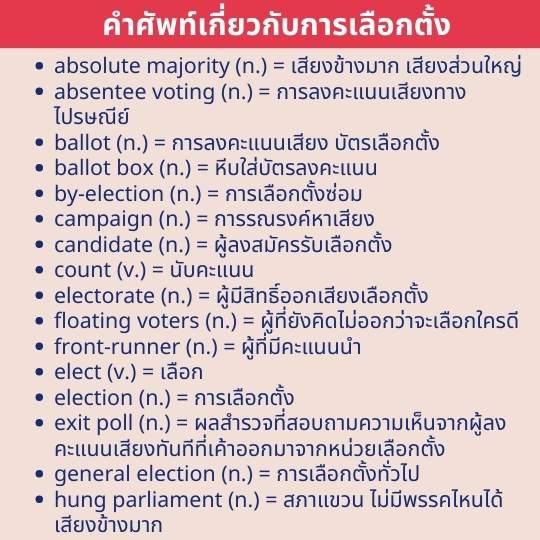



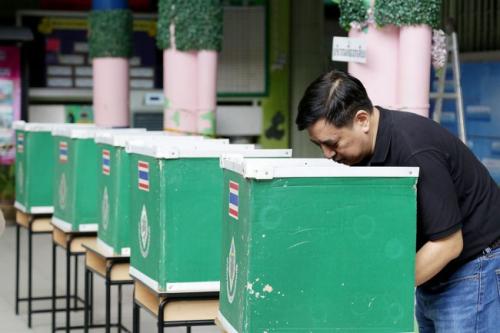
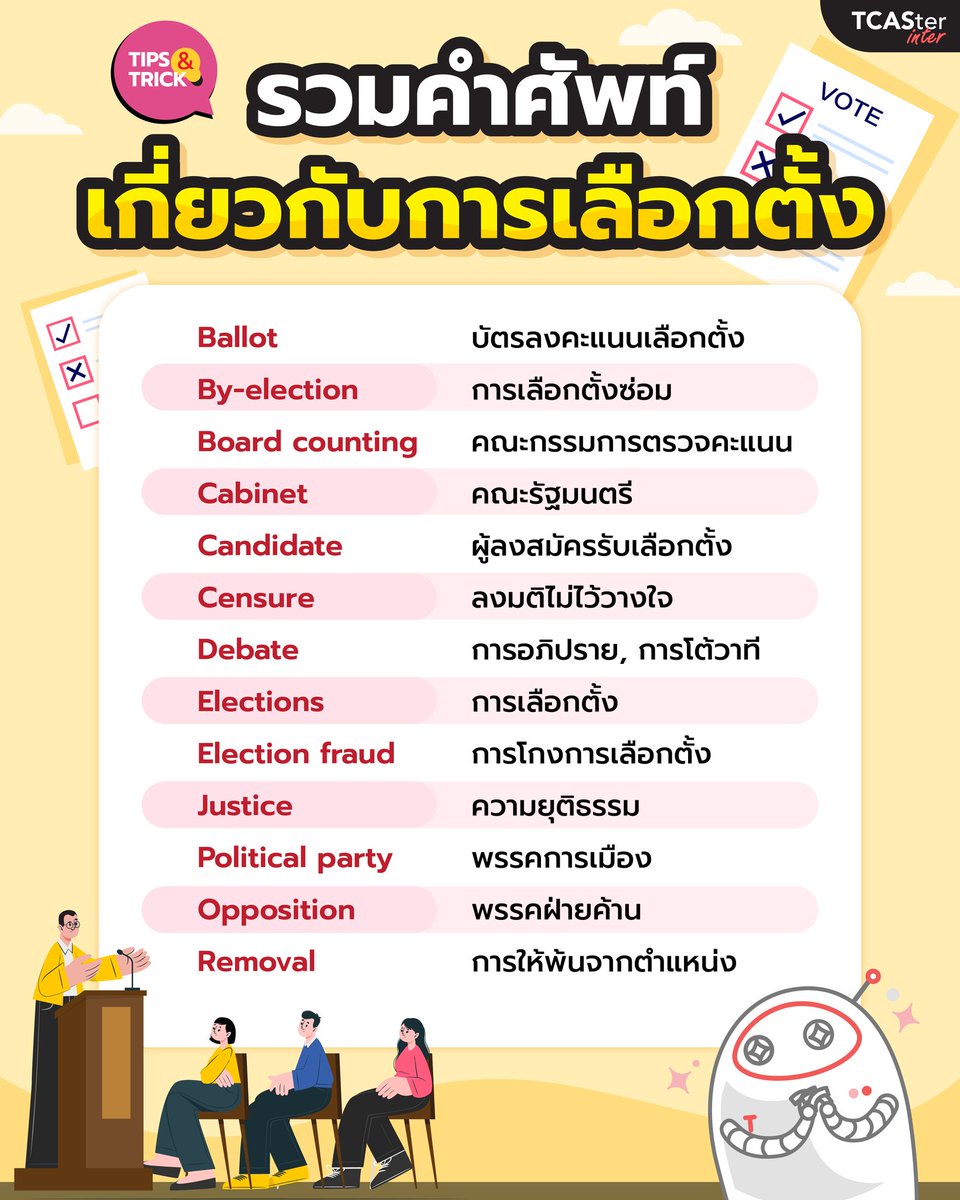





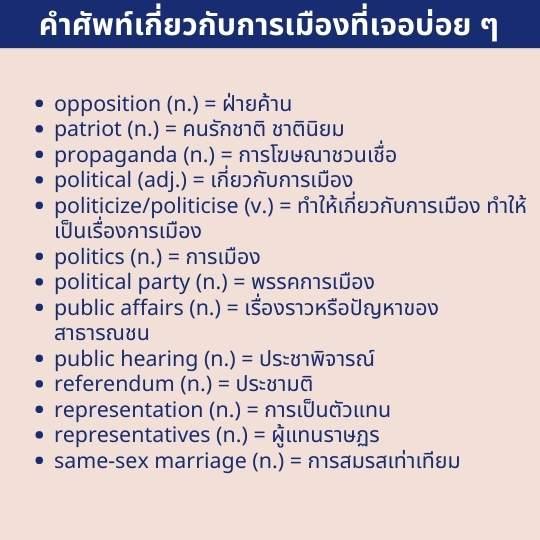



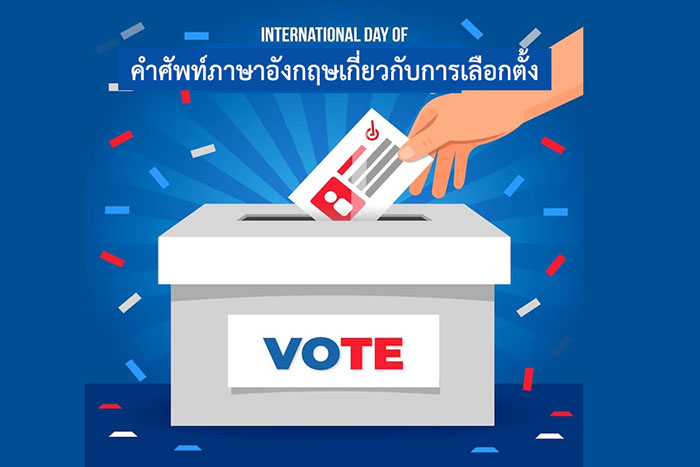








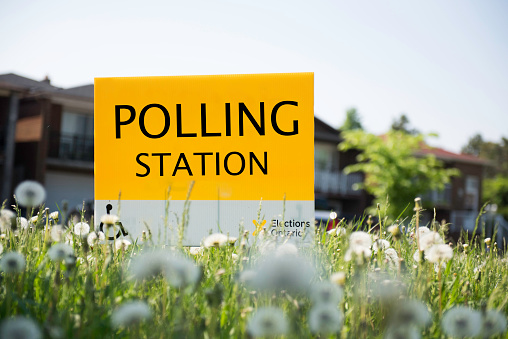








![[English Thai on Earth] บทสนทนาภาษาอังกฤษ :: การเลือกตั้ง (The election ... [English Thai On Earth] บทสนทนาภาษาอังกฤษ :: การเลือกตั้ง (The Election ...](https://t1.blockdit.com/photos/2020/12/5fdebf37617c520cd883427c_800x0xcover_3ig7UvjR.jpg)


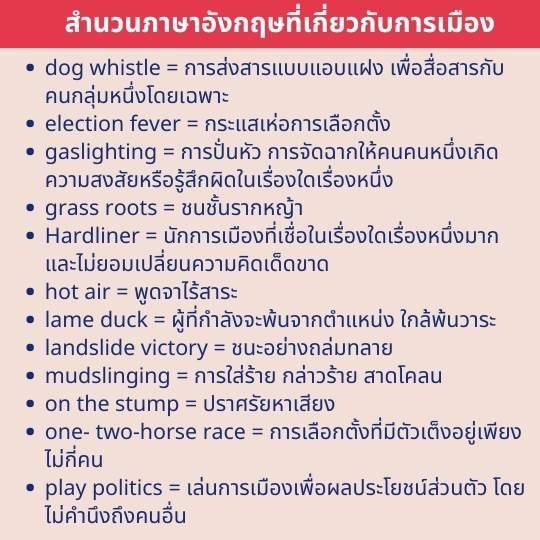










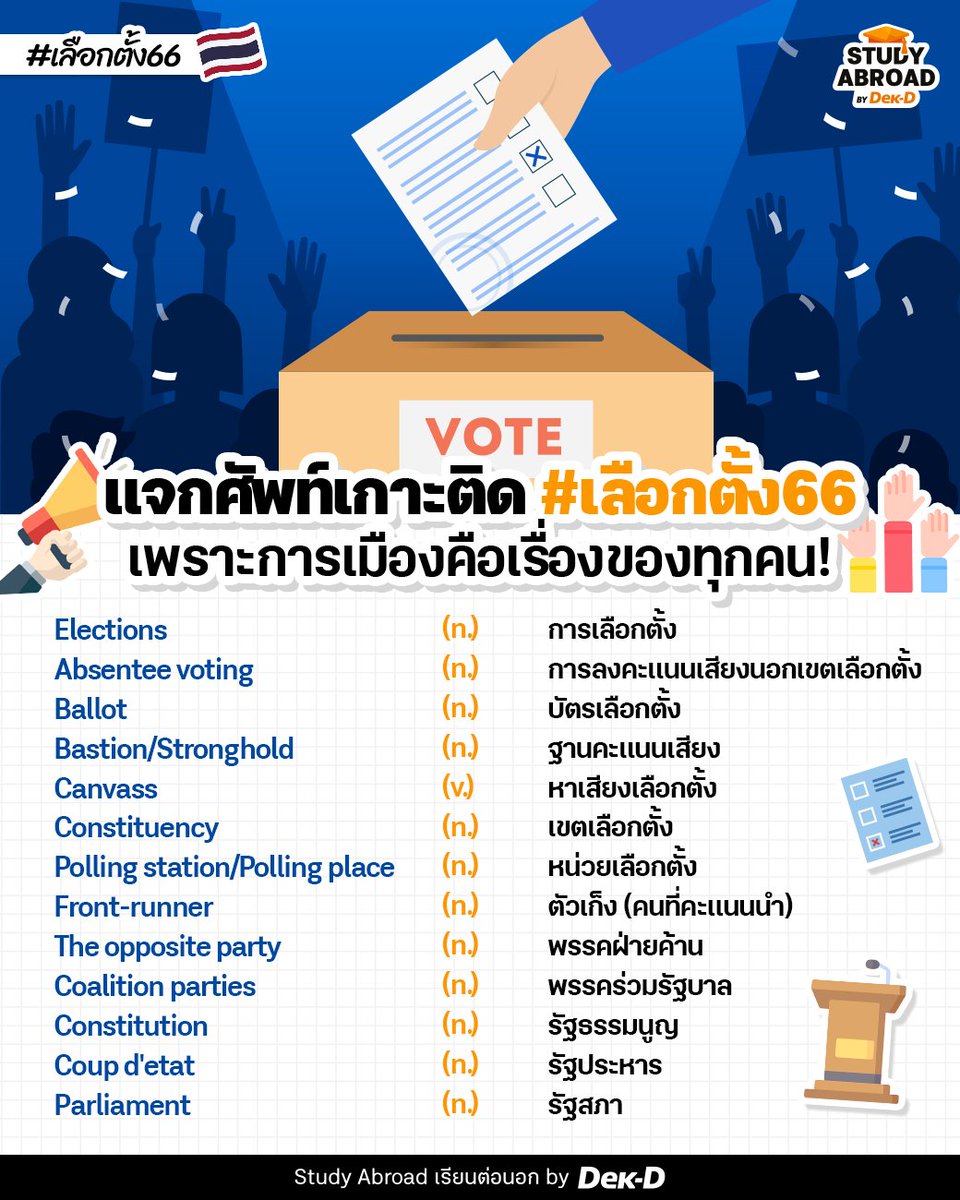


ลิงค์บทความ: เลือกตั้ง ภาษาอังกฤษ.
ดูข้อมูลเพิ่มเติมเกี่ยวกับโพสต์หัวข้อนี้ เลือกตั้ง ภาษาอังกฤษ.
- *เลือกตั้ง* แปลว่าอะไร ดูความหมาย ตัวอย่างประโยค หมายความว่า …
- เลือกตั้ง แปลว่าอะไร ดูความหมาย ตัวอย่างประโยค หมายความว่า …
- คำศัพท์ภาษาอังกฤษที่เกี่ยวกับการเลือกตั้ง รู้ไว้ เผื่อได้เลือก
- มัดรวมศัพท์ภาษาอังกฤษเกี่ยวกับการเมือง 114 คำ
- 📍คำศัพท์เกี่ยวกับการเลือกตั้ง (election) ไทย-อังกฤษ 15 หน้า …
- เรียนภาษาอังกฤษ ด้วยคำศัพท์เกี่ยวกับการเลือกตั้ง – IELTS
ดูเพิ่มเติม: giaydb.com/category/calendar